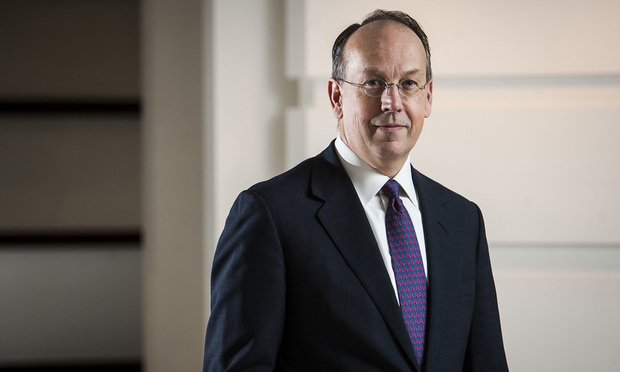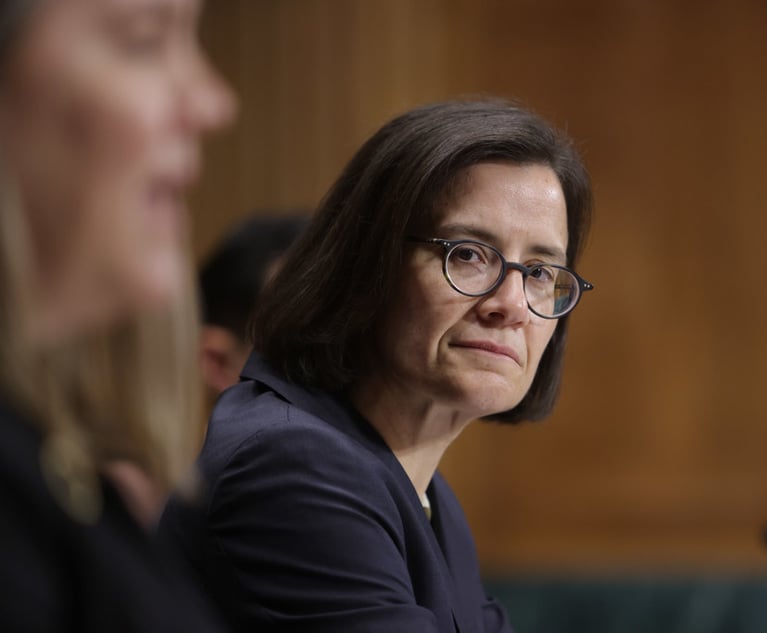Litigator of the Week: For Paul Clement, Jumping into a SCOTUS Case at the Last Minute is “What We Do”
The former George W. Bush-era solicitor general prides himself and his appellate team at Kirkland & Ellis on being able to climb aboard fast-moving Supreme Court cases at the last minute.
May 28, 2018 at 01:55 AM
4 minute read
The original version of this story was published on Litigation Daily
 Paul Clement of Kirkland & Ellis
Paul Clement of Kirkland & EllisLast August, Kirkland & Ellis partner Paul Clement was minding his own business, not thinking much about arbitration or class actions. He was prepping for an important U.S. Supreme Court oral argument testing the scope of the Alien Tort Statute, set for October 11.
Then came the phone call from two fellow titans of the Supreme Court bar: Neal Katyal of Hogan Lovells and Kannon Shanmugam of Williams & Connolly. They represented employers in three high-profile cases before the high court, consolidated under the name of Epic Systems Corp. v. Lewis. The cases were all about whether arbitration agreements could preclude employees from resorting to class actions to resolve disputes in workplace disputes. The cases were scheduled to be argued on October 2.
“They said there might be a possibility of me getting involved in the case,” Clement recalled this week. Even though jumping in could blow up his preparation for the October 11 case, Clement said, “I was delighted. When I got the call it was a surprise, but it was a great opportunity to get involved in a very important case.”
The phone call led to Clement arguing the Epic case himself—not Katyal or Shanmugam. On May 21, Clement celebrated a clear victory in Epic when Justice Neil Gorsuch, writing for a 5-4 majority, favored arbitration over class actions.
“It was a pretty definitive win for the employers,” Clement said. Unlike other split decisions that leave loose threads behind, he added, “It really does resolve the issue and doesn't leave a lot of possible trap doors.”
Why Clement got to argue the Epic case when either Shanmugam or Katyal could have carried the ball to victory may never be fully explained. “I'm kind of the wrong person to ask,” Clement said.
Katyal and Shanmugam have declined to talk about it. But at some point last summer, they apparently reached an impasse over who would argue. Instead of flipping a coin, they reached out to someone else.
The fact that they reached out to Clement and not another star advocate is easier to fathom. The former George W. Bush-era solicitor general prides himself and his appellate team on being able to climb aboard fast-moving Supreme Court cases at the last minute. He has argued 92 cases before the justices.
“Jumping into cases relatively late in the process is what we do,” the 51-year-old Clement said. “You know, sometimes when you have three cases that are essentially consolidated for argument, people have ideas about how to best argue the case, or who should argue the case. Sometimes you end up going with somebody who hasn't been involved just because that's the way to get everybody on the same page.”
Once Clement joined the team, he said, “Both Neal and Kannon could not have been better or more gracious” in looping him into the final briefing before oral argument. “From that point forward, it was a very cooperative process.”
Kirkland partner Megan Wold became “kind of my right hand person” in preparation for the Epic argument, Clement said, and she was at his side during his 20 minutes of oral argument. Clement was conversant with the arbitration issues in part because of his role in the 2013 case American Express v. Italian Colors, even though he was on the pro-class action side. Clement emerged from the argument fairly confident of victory, and he was right.
Clement argued a total of six cases before the high court this term—almost routine for him, but an astronomical number for most. He won four of his cases, one is still pending, and then on May 14, came Murphy v. NCAA—the blockbuster sports betting case. Clement represented the NCAA, which lost to New Jersey governor Philip Murphy. The winning lawyer was Gibson, Dunn & Crutcher's Theodore Olson, who hired Clement as deputy SG in 2001.
How did Clement feel about losing in the gambling case? He put it this way: “You know, this was a better Monday than last Monday.”
This content has been archived. It is available through our partners, LexisNexis® and Bloomberg Law.
To view this content, please continue to their sites.
Not a Lexis Subscriber?
Subscribe Now
Not a Bloomberg Law Subscriber?
Subscribe Now
NOT FOR REPRINT
© 2025 ALM Global, LLC, All Rights Reserved. Request academic re-use from www.copyright.com. All other uses, submit a request to [email protected]. For more information visit Asset & Logo Licensing.
You Might Like
View All
Arbitrators Under Fire for Allegedly Forcing Workers to 'Stay or Pay' Employers
5 minute read
Patent Disputes Over SharkNinja, Dyson Products Nearing Resolution

Consumer Had Notice of Arbitration Agreement on Double-Sided Contract, Judge Rules

‘Not A Kindergarten Teacher’: Judge Blasts Keller Postman, Jenner & Block, in Mass Arb Dispute
6 minute readTrending Stories
Who Got The Work
J. Brugh Lower of Gibbons has entered an appearance for industrial equipment supplier Devco Corporation in a pending trademark infringement lawsuit. The suit, accusing the defendant of selling knock-off Graco products, was filed Dec. 18 in New Jersey District Court by Rivkin Radler on behalf of Graco Inc. and Graco Minnesota. The case, assigned to U.S. District Judge Zahid N. Quraishi, is 3:24-cv-11294, Graco Inc. et al v. Devco Corporation.
Who Got The Work
Rebecca Maller-Stein and Kent A. Yalowitz of Arnold & Porter Kaye Scholer have entered their appearances for Hanaco Venture Capital and its executives, Lior Prosor and David Frankel, in a pending securities lawsuit. The action, filed on Dec. 24 in New York Southern District Court by Zell, Aron & Co. on behalf of Goldeneye Advisors, accuses the defendants of negligently and fraudulently managing the plaintiff's $1 million investment. The case, assigned to U.S. District Judge Vernon S. Broderick, is 1:24-cv-09918, Goldeneye Advisors, LLC v. Hanaco Venture Capital, Ltd. et al.
Who Got The Work
Attorneys from A&O Shearman has stepped in as defense counsel for Toronto-Dominion Bank and other defendants in a pending securities class action. The suit, filed Dec. 11 in New York Southern District Court by Bleichmar Fonti & Auld, accuses the defendants of concealing the bank's 'pervasive' deficiencies in regards to its compliance with the Bank Secrecy Act and the quality of its anti-money laundering controls. The case, assigned to U.S. District Judge Arun Subramanian, is 1:24-cv-09445, Gonzalez v. The Toronto-Dominion Bank et al.
Who Got The Work
Crown Castle International, a Pennsylvania company providing shared communications infrastructure, has turned to Luke D. Wolf of Gordon Rees Scully Mansukhani to fend off a pending breach-of-contract lawsuit. The court action, filed Nov. 25 in Michigan Eastern District Court by Hooper Hathaway PC on behalf of The Town Residences LLC, accuses Crown Castle of failing to transfer approximately $30,000 in utility payments from T-Mobile in breach of a roof-top lease and assignment agreement. The case, assigned to U.S. District Judge Susan K. Declercq, is 2:24-cv-13131, The Town Residences LLC v. T-Mobile US, Inc. et al.
Who Got The Work
Wilfred P. Coronato and Daniel M. Schwartz of McCarter & English have stepped in as defense counsel to Electrolux Home Products Inc. in a pending product liability lawsuit. The court action, filed Nov. 26 in New York Eastern District Court by Poulos Lopiccolo PC and Nagel Rice LLP on behalf of David Stern, alleges that the defendant's refrigerators’ drawers and shelving repeatedly break and fall apart within months after purchase. The case, assigned to U.S. District Judge Joan M. Azrack, is 2:24-cv-08204, Stern v. Electrolux Home Products, Inc.
Featured Firms
Law Offices of Gary Martin Hays & Associates, P.C.
(470) 294-1674
Law Offices of Mark E. Salomone
(857) 444-6468
Smith & Hassler
(713) 739-1250








